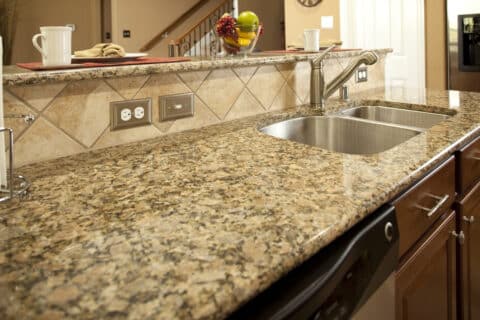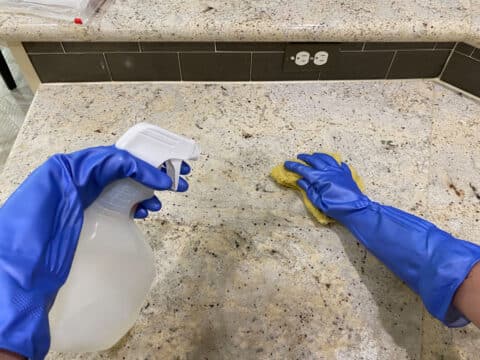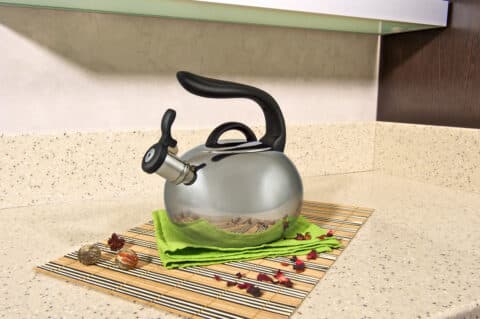How to Seal and Care for Granite Countertops
The enduring popularity of granite countertops in home remodel projects is attributed to their durability and aesthetic appeal. Granite countertops are a popular choice in high traffic areas such as kitchens and bathrooms because of their resilience to daily wear and tear. Granite countertops offer optimal performance while adding beauty and value to your home or space.
In order to maintain the beauty and longevity of granite surfaces, proper sealing and care are important. Understanding the nature of granite, appropriate sealers, and implementing a regular maintenance schedule will help you protect and properly care for your granite countertops.
Understanding Granite Countertops
Granite is a natural stone renowned for its strength and hardness. It is an igneous rock formed from magma and pressurized heat that is quarried into slabs and then used for multiple purposes. Granite is a popular choice for a countertop material because of its innate characteristics that make it naturally heat, scratch and stain resistant.
Choosing granite for countertops has many advantages that make it relatively low maintenance and easy to care for. However, because granite is a natural stone, it is porous and can absorb liquids and stains if not properly sealed. Sealants act as a protective barrier that repels liquids and bacteria, making countertops easier to clean.
There are common misconceptions surrounding granite countertop care. For starters, there’s a misconception that granite countertops do not require sealing. This is untrue. Sealing is a vital part to granite countertop care as it helps prevent liquids and spills from breaching the surface. Even though a sealant helps protect the granite, it does not make it completely stain-proof. Spills and messes should be cleaned promptly and thoroughly to prevent staining, even if the countertop is sealed.
Sealing Granite Countertops
 Sealing granite countertops is important to prevent stains, spills, and etching. The porous nature of granite makes it prone to absorb liquids and bacteria. Applying a high-end stone intended sealant can create a protective barrier that not only prevents substances from penetrating the granite, but also helps to prevent cracks or chips. In addition, sealed granite will make it easier to clean and maintain overall, making for an appealing surface.
Sealing granite countertops is important to prevent stains, spills, and etching. The porous nature of granite makes it prone to absorb liquids and bacteria. Applying a high-end stone intended sealant can create a protective barrier that not only prevents substances from penetrating the granite, but also helps to prevent cracks or chips. In addition, sealed granite will make it easier to clean and maintain overall, making for an appealing surface.
A high-quality sealant that is designed specifically for natural stones such as granite is essential. There are two main types of stone sealers available: topical sealers and penetrating sealers. Prior to applying a sealant to your stone, you should decide on which sealer is necessary for your granite based on its use and your expectations.
Topical Sealer
A topical sealer does not go beyond the surface. It provides a protective barrier directly on the surface of the granite to protect against liquids and substances. It is an effective sealer for preventing stains; however, it can alter the appearance of your granite by giving it a glossy finish.
Penetrating Sealer
Penetrating sealers are absorbed into the pores and crevices of granite or natural stone. This creates a deeper protective barrier that protects the stone from within. This type of sealer is beneficial because it is longer-lasting and will not alter the appearance or look of your granite, especially if given a textured finish such as leathered or honed.
Step-by-Step Guide to Sealing Granite Countertops
Sealing granite countertops is simple and effective when done properly. Follow this general step-by-step process to successfully apply sealer to your granite countertops:
Preparing the surface
 To prepare the surface for sealing, you should begin by cleaning the granite with a pH-neutral cleaner. Remove any dirt, debris, or moisture to ensure a proper seal. Test whether the granite needs to be resealed by sprinkling a few drops of water on the surface — if the water sits on top and is not absorbed, you do not require another coat of sealer at this time.
To prepare the surface for sealing, you should begin by cleaning the granite with a pH-neutral cleaner. Remove any dirt, debris, or moisture to ensure a proper seal. Test whether the granite needs to be resealed by sprinkling a few drops of water on the surface — if the water sits on top and is not absorbed, you do not require another coat of sealer at this time.
Choosing the right sealer
Decide whether a topical or penetrating sealer is best for your granite surface. Carefully follow the instructions on the sealer package.
Applying the sealer properly
To properly apply the sealant, follow the specific application method provided on the packaging. Use a soft and lint free cloth and evenly spread the sealer, focusing on small sections at a time. This will guarantee an even application across the surface.
Drying and curing time
Allow time for the sealer to sit and adhere to the surface. The amount of time needed to penetrate the surface is specific to the manufacturer and the application method. Once the absorption process is complete, use a dry, clean cloth to buff and evenly wipe the surface to help remove any excess sealer — repeat this step as necessary.
Allow the sealer to cure for a minimum of 24 hours before putting the surface to use. This will give enough time for the sealer to fully bond to the granite and create a protective barrier.
Testing the effectiveness of the sealer
Once the sealer is applied and has reached its cure time, you should test whether it is sealed properly. You can do this by performing the water test to see whether the water beads or absorbs into the surface. If the water is not absorbed, you successfully cured your granite.
Caring for Sealed Granite Countertops
A sealer is absolutely necessary for prolonging the lifespan of your granite countertops and maintaining their pristine appearance. Knowing the most effective ways to care for your sealed granite countertops is important. Sealing alone is not adequate to care for your granite countertops. A daily maintenance routine and preventive measures to protect the stone will ensure the longevity and optimal performance of your granite surface.
Daily Maintenance Routine
A daily maintenance routine for your granite countertops is essential, especially when used in high traffic areas. This routine should include:
- Cleaning spills promptly
- Using mild, pH-neutral cleaners
- Avoiding abrasive scrubbing tools
If a mess or spill occurs, it’s important that you quickly clean or wipe the spill to prevent staining or etching. If left for a prolonged period of time, a liquid can penetrate the surface and cause staining or permanent damage — even when a sealant has been applied. Getting into the habit of wiping spills immediately will help prevent this from happening.
Not all household cleaners can be used on granite. Many common household cleaners contain abrasive or acidic ingredients, such as lemon, that can be harmful to the stone or sealant. When cleaning your granite countertops, you should always use a mild, pH- neutral cleaner.
When cleaning your granite surface, you should avoid using abrasive scrubbing tools. These can easily scratch the sealant and potentially harm the stone over time. Always use a non-abrasive cloth when cleaning or polishing the surface.
Preventative Measures to Protect Granite Countertops
 Preventative measures should be taken to protect granite countertops. As a preventative measure, you should refrain from using rough or acidic materials. Acidic cleaning agents should be avoided to prevent scratching the surface or damaging the sealer. In addition, acidic foods and substances such as lemon juice, vinegar, or wine should be cleaned promptly with a soft cloth. A stubborn stain that has not yet penetrated the surface can be cleaned with a neutral soap and just a little elbow grease, rather than an abrasive tool.
Preventative measures should be taken to protect granite countertops. As a preventative measure, you should refrain from using rough or acidic materials. Acidic cleaning agents should be avoided to prevent scratching the surface or damaging the sealer. In addition, acidic foods and substances such as lemon juice, vinegar, or wine should be cleaned promptly with a soft cloth. A stubborn stain that has not yet penetrated the surface can be cleaned with a neutral soap and just a little elbow grease, rather than an abrasive tool.
Using cutting boards and hot pads or trivets can prevent damage to your countertop surface. Sharp knives can easily scratch the sealer and become dull over time when used on a hard stone such as granite. In addition, hot pots and pans can result in heat damage and cause the sealer to wear. Remembering to use these tools as preventative measures will enhance and maintain the condition of your granite.
Regularly resealing your granite countertops as needed is essential to protect them long-term. Depending on the space and use for your granite, resealing times will vary. As a general rule of thumb, you should plan to reseal your granite countertops every one to two years.
Troubleshooting Common Issues
Common issues that arise in natural stone countertops such as stains, etching, discoloration or scratches should be addressed promptly. Even though granite is resistant to stains and scratches, they can still occur if not properly addressed and cared for. Depending on the source and severity of the blemish, you should do research and consult with a professional before treating the issue on your own.
If staining or etching occurs, there are special troubleshooting techniques you can use to help remove them. For stains, you can typically use a poultice solution that uses simple household products and gently work to scrub away the stain with a non-abrasive cloth. Etching occurs when acidic or oil-based substances breach the granite surface, causing a discolored spot. To prevent etching, you should quickly blot these types of spills and avoid using acidic cleaning products. For more stubborn spots and stains, you may want to consider hiring a professional stone restoration expert.
While granite is relatively scratch and chip resistant, it is still possible for these blemishes to appear. Minor scratches can sometimes be buffed out using a granite polishing powder. But deeper scratches may require the help of a professional. Small chips in granite can also be repaired by a restoration specialist.
Professional Maintenance and Restoration
There are some troubleshooting techniques you can use to address issues such as stains or scratches. However, in some cases you may need to seek professional help. More severe and stubborn stains will require special tools and equipment to lift it from the stone. The source and size of the stain or blemish can also factor into whether professional restoration is needed.
Granite countertop maintenance is necessary to preserve the appearance and performance of your stone. Designers and fabricators offer services to help maintain and restore your granite to its best condition. These services often include:
- Deep cleaning and resealing
- Repairing chips and scratches
- Polishing and restoring the shine
Granite and Marble Designs Can Help with Granite Countertop Sealing and Maintenance
Granite and Marble Designs provides the best granite countertops and professional restoration services in Denver. We source granite from the best suppliers and fabricate your slab to perfection for a proper fit. Prior to installing your granite countertops, we apply a high-quality stone sealer on all natural stones for added protection. We aim to achieve customer satisfaction through our extensive expertise and limited lifetime warranty.
Our design consultants will educate you on the nature of granite and its composition so that you have a full understanding of the stone and how to properly care for it. We provide maintenance tips and stone polisher so that you can restore your granite to its pristine condition. We promise that you will be pleased with the quality of our work backed by our StoneDoneRight™ Approach.
Request a free project quote for your granite countertops or restoration service, or call 303-551-6000.
